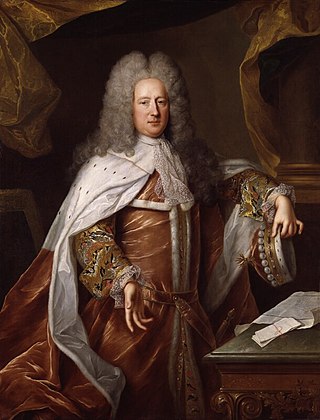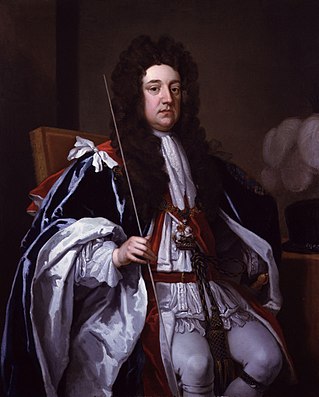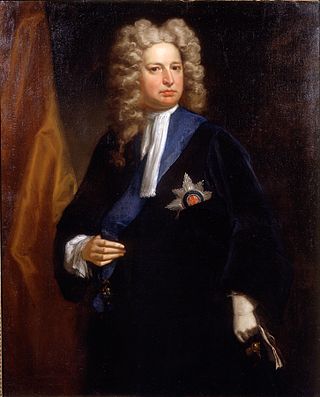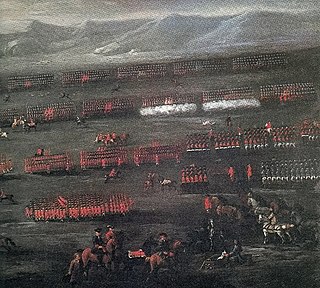
Jonathan Swift was an Anglo-Irish writer who became Dean of St Patrick's Cathedral, Dublin, hence his common sobriquet, "Dean Swift". His deadpan, ironic writing style, particularly in A Modest Proposal, has led to such satire being subsequently termed "Swiftian".

Anne was Queen of England, Scotland, and Ireland from 8 March 1702, and Queen of Great Britain and Ireland following the ratification of the Acts of Union 1707 merging the kingdoms of Scotland and England, until her death in 1714.

Robert Walpole, 1st Earl of Orford, known between 1725 and 1742 as Sir Robert Walpole, was a British Whig politician who served as Prime Minister of Great Britain from 1721 to 1742. He also served as First Lord of the Treasury, Chancellor of the Exchequer, and Leader of the House of Commons, and is generally regarded as the de facto first prime minister of Great Britain.

General John Churchill, 1st Duke of Marlborough, 1st Prince of Mindelheim, 1st Count of Nellenburg, Prince of the Holy Roman Empire, was an English soldier and statesman. From a gentry family, he served as a page at the court of the House of Stuart under James, Duke of York, through the 1670s and early 1680s, earning military and political advancement through his courage and diplomatic skill. He is known for never having lost a battle.

Sarah Churchill, Duchess of Marlborough, Princess of Mindelheim, Countess of Nellenburg, was an English courtier who rose to be one of the most influential women of her time through her close relationship with Anne, Queen of Great Britain. The Duchess of Marlborough's relationship and influence with Anne were widely known, and leading public figures often turned their attentions to her, hoping for favour from Anne.

John Arbuthnot FRS, often known simply as Dr Arbuthnot, was a Scottish physician, satirist and polymath in London. He is best remembered for his contributions to mathematics, his membership in the Scriblerus Club, and for inventing the figure of John Bull.

Henry St. John, 1st Viscount Bolingbroke was an English politician, government official and political philosopher. He was a leader of the Tories, and supported the Church of England politically despite his antireligious views and opposition to theology.

Sidney Godolphin, 1st Earl of Godolphin, was an English Tory politician and peer. He was a Privy Councillor and Secretary of State for the Northern Department before he attained real power as First Lord of the Treasury. He was instrumental in negotiating and passing the Acts of Union 1707 with Scotland, which created the Kingdom of Great Britain. He had many other roles, including that of Governor of Scilly.

Robert Harley, 1st Earl of Oxford and Earl Mortimer, KG PC FRS was an English statesman and peer of the late Stuart and early Georgian periods. He began his career as a Whig, before defecting to a new Tory ministry. He was raised to the peerage of Great Britain as an earl in 1711. Between 1711 and 1714 he served as Lord High Treasurer, effectively Queen Anne's chief minister. He has been called a prime minister, although it is generally accepted that the de facto first minister to be a prime minister was Robert Walpole in 1721.

Richard Temple, 1st Viscount Cobham was a British soldier and Whig politician. After serving as a junior officer under William III during the Williamite War in Ireland and during the Nine Years' War, he fought under John Churchill, 1st Duke of Marlborough, during the War of the Spanish Succession. During the War of the Quadruple Alliance Temple led a force of 4,000 troops on a raid on the Spanish coastline which captured Vigo and occupied it for ten days before withdrawing. In Parliament he generally supported the Whigs but fell out with Sir Robert Walpole in 1733. He was known for his ownership of and modifications to the estate at Stowe and for serving as a political mentor to the young William Pitt.

Simon Harcourt, 1st Viscount Harcourt, PC of Stanton Harcourt, Oxfordshire, was an English Tory politician who sat in the English and British House of Commons from 1690 until 1710. He was raised to the peerage as Baron Harcourt in 1711 and sat in the House of Lords, becoming Queen Anne's Lord High Chancellor of Great Britain. He was her solicitor-general and her commissioner for arranging the union with Scotland. He took part in the negotiations preceding the Peace of Utrecht.
The Tories were a loosely organised political faction and later a political party, in the Parliaments of England, Scotland, Ireland, Great Britain and the United Kingdom. They first emerged during the 1679 Exclusion Crisis, when they opposed Whig efforts to exclude James, Duke of York from the succession on the grounds of his Catholicism. Despite their fervent opposition to state-sponsored Catholicism, Tories opposed his exclusion because of their belief that inheritance based on birth was the foundation of a stable society.

General Richard Savage, 4th Earl Rivers PC was an English nobleman and soldier who was a senior Army officer in the English and then British Army. The second son of Thomas Savage, 3rd Earl Rivers and his first wife Elizabeth Scrope, Savage was styled Viscount Colchester after the death of his elder brother Thomas in 1680, he was designated by that title until he succeeded to the peerage upon the death of his father, the 3rd Earl, in 1694. Savage served as Master-General of the Ordnance and Constable of the Tower, and was briefly commander-in-chief of the forces in lieu of James Butler, 2nd Duke of Ormonde until his death in 1712.

Abigail Masham, Baroness Masham, was an English courtier. She was a favourite of Queen Anne, and a cousin of Sarah, Duchess of Marlborough.
The Whig Junto is the name given to a group of leading Whigs who were seen to direct the management of the Whig Party and often the government, during the reigns of William III and Anne. The Whig Junto proper consisted of John Somers, later Baron Somers; Charles Montagu, later Earl of Halifax; Thomas Wharton, later Marquess of Wharton, and Edward Russell, later Earl of Orford. They came to prominence due to the favour of Robert Spencer, 2nd Earl of Sunderland and during the reign of Queen Anne, Sunderland's son, the 3rd Earl succeeded his father. Opponents gave them the nickname "the five tyrannising lords". Other figures prominent around the edges of the Junto include Sir John Trenchard and Thomas Tollemache.
The Patriot Whigs, later the Patriot Party, were a group within the Whig Party in Great Britain from 1725 to 1803. The group was formed in opposition to the government of Robert Walpole in the House of Commons in 1725, when William Pulteney and seventeen other Whigs joined with the Tory Party in attacks against the ministry. By the mid-1730s, there were over one hundred opposition Whigs in the Commons, many of whom embraced the Patriot label. For many years, they provided a more effective opposition to the Walpole administration than the Tories were.

The Harleyministry was the British government that existed between 1710 and 1714 in the reign of Queen Anne. It was headed by Robert Harley and composed largely of Tories. Harley was a former Whig who had changed sides, bringing down the seemingly powerful Whig Junto and their moderate Tory ally Lord Godolphin. It came during the Rage of Party when divisions between the two factions were at their height, and a "paper war" broke out between their supporters. Amongst those writers supportive of Harley's government were Jonathan Swift, Daniel Defoe, Delarivier Manley, John Arbuthnot and Alexander Pope who clashed with members of the rival Kit-Kat Club.

The Jacobite rising of 1715 was the attempt by James Edward Stuart to regain the thrones of England, Ireland and Scotland for the exiled Stuarts.
Country Party was the name employed in the Kingdom of England by political movements which campaigned in opposition to the Court Party.
The Examiner was a newspaper commenced on 3 August 1710 and edited by Jonathan Swift from 2 November 1710 to 1714. It promoted a Tory perspective on British politics, at a time when Queen Anne had replaced Whig ministers with Tories.
















